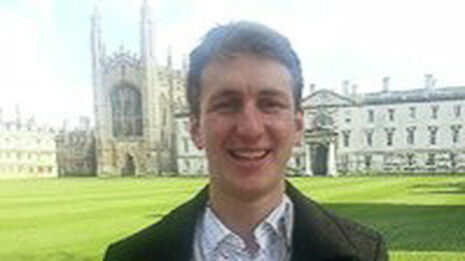Who is Dr Aleksandr Kogan, the Cambridge academic accused of misusing Facebook data?
Everything we know about the neuroscientist who has been banned by the social media giant for passing on millions of users’ data

Dr Aleksandr “Alex” Kogan, a University lecturer at the Department of Psychology, has been thrust into the limelight after he was banned from Facebook for improper use of data.
A multi-organisation investigation lead by revelations from a whistleblower who assisted Kogan at the data-analysis and influence firm Cambridge Analytica has alleged that the Cambridge academic developed tools to analyse and influence the behaviour of Facebook users. The whistleblower, Christopher Wylie, has suggested that Kogan’s tools may have helped Cambridge Analytica influence the outcome of the 2016 US election.
Kogan was born in Moldova, and lived in Moscow until he moved the United States at the age of seven. He studied at the University of California, Berkeley, and in Hong Kong before joining the University of Cambridge as a lecturer in psychology and psychometrics.
His listed interests are behavioural analysis, cross-sectional and cohort studies, and electrophysiological recording techniques. The most recent publication on his University profile is “The role of positive self-evaluation on cross-cultural differences in well-being”, from 2015.
After getting married in Singapore, Kogan was temporarily known as Aleksandr Spectre, as he is called on an outdated profile on the University’s website.
German periodical Das Magazin reported that, in 2014, Kogan approached another Cambridge academic, Dr Michael Kosinski, who had been developing behavioural models based on users’ social media interests. Kogan allegedly expressed an interest in accessing information from ‘MyPersonality’, an app Kosinski had helped develop.
Kosinski, who is part of the Psychometrics Centre, based at Judge Business School, grew uncomfortable with Kogan’s connection to the firm SCL, which controls Cambridge Analytica, and distanced himself from Kogan. Das Magazin claims the University feared reputational damage through its association to the organisation.
Kogan is also an associate professor at the St Petersburg University – a fact his Cambridge colleagues, aside from the head of the Department of Psychology, were not told, according to The Guardian/Observer. In this position, he received funding from the Russian government to study ‘Stress, health and psychological wellbeing in social networks’. In a CV from 2014, which was previously available on the University’s website, Kogan made no mention of his connection to St Petersburg, or to having received any grants.
Got a story for us?
Seen something you think Varsity should be talking about? Contact our News team at news@varsity.co.uk.
Kogan’s company, Global Science Research (GSR), was behind the app, ‘thisisyourdigitallife’, which harvested the data of tens of millions of Facebook users which was then passed on to Cambridge Analytica. According to Wylie, hundreds of thousands of Facebook users took personality tests with the app. In doing so, users consented to their data being collected for academic use.
But the app also collected the personal information of test-takers’ Facebook friends, thus racking up data on tens of millions of users, which was accessible to Cambridge Analytica. This contravened the social network’s ‘platform policy’ which banned the collection of friends’ data for any reasons aside from improving user experience.
In May 2014, Kogan set up GSR along with former University of Cambridge postdoctoral researcher, Joseph Chancellor. The pair initially registered the company’s address at Cory House, postgraduate accomodation at Magdalene College, Cambridge.
Alexander Slinger, a graduate of Corpus Christi College, Cambridge, was appointed as a director of GSR in August 2014, alongside Kogan and Chancellor. Chancellor resigned from GSR in September 2015, and Slinger in May 2016. The company was formally dissolved on 31 October 2017.
Chancellor now works on Facebook’s User Experience Research team. In 2017, Facebook told the investigative news outlet The Intercept that Chancellor’s work at GSR “has no bearing on the work that he does at Facebook”.
Kogan and Slinger were also both listed as directors of Euler Group Limited, a company which existed from February to October 2016. According to Slinger’s LinkedIn, he now works for finance company Arrow Global.
In early 2015, Kogan spoke at the Cambridge Science Festival, under the title: “What your Facebook says about you”. In an interview with the festival’s organisers, which has been removed from the University’s website, Kogan answered the question “What does your Facebook say about you?”.
“Trick question!” he said, “It probably doesn’t say much about you personally, but it can shine a great deal of light on human nature and social processes in general. But to find out more, you’ll have to come to the talk”.
- Update 11th April: This article was updated to link to an article covering comments made by Kogan at the Cambridge Science festival in 2015.
 Features / Are you more yourself at Cambridge or away from it? 27 January 2026
Features / Are you more yourself at Cambridge or away from it? 27 January 2026 News / Vigil held for tenth anniversary of PhD student’s death28 January 2026
News / Vigil held for tenth anniversary of PhD student’s death28 January 2026 Interviews / Lord Leggatt on becoming a Supreme Court Justice21 January 2026
Interviews / Lord Leggatt on becoming a Supreme Court Justice21 January 2026 News / Reform candidate retracts claim of being Cambridge alum 26 January 2026
News / Reform candidate retracts claim of being Cambridge alum 26 January 2026 Comment / How Cambridge Made Me Lose My Faith26 January 2026
Comment / How Cambridge Made Me Lose My Faith26 January 2026












